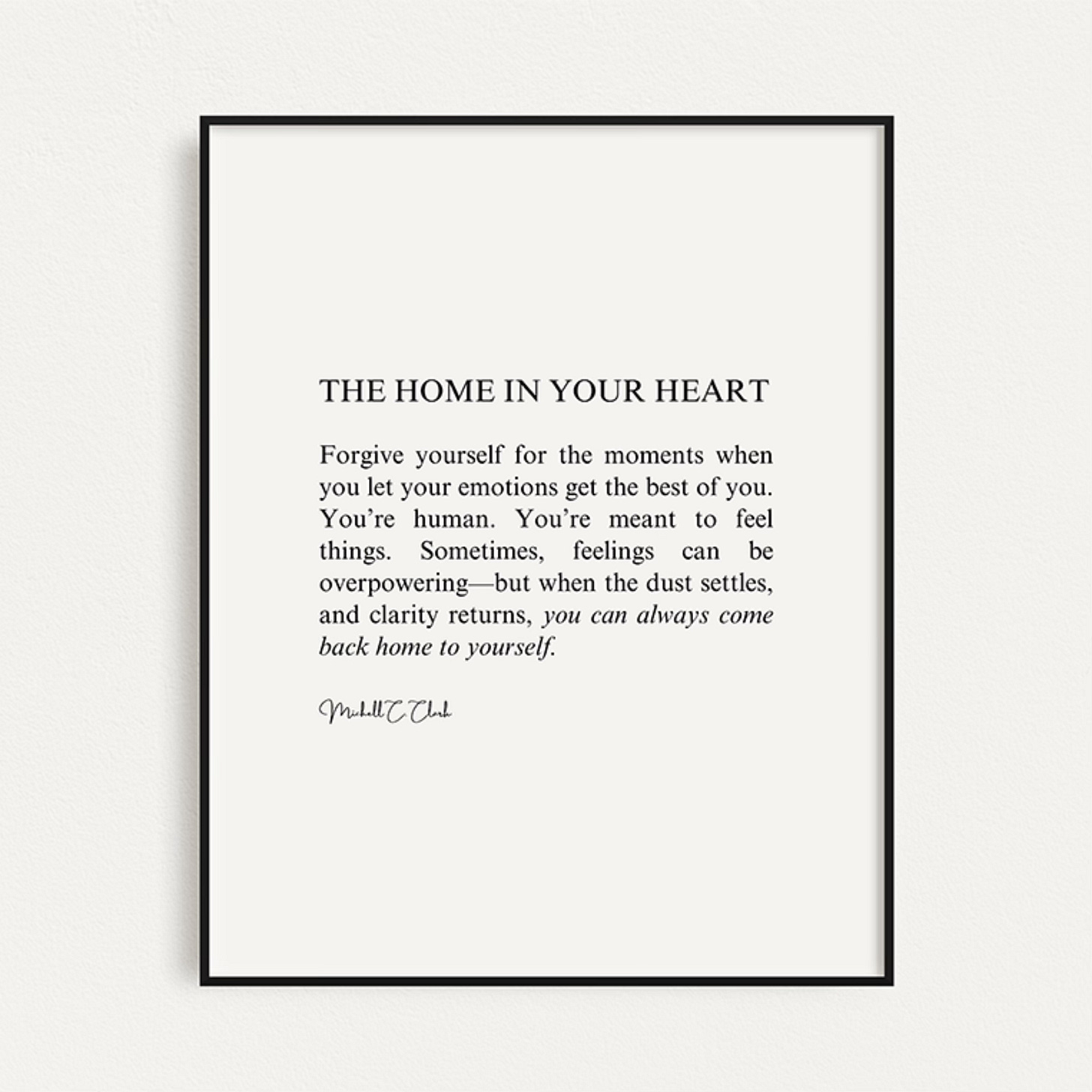I've been here before.
Same dance, different room.
Different people, same limiting beliefs.
This time, it was a work meeting.
I knew exactly what I was talking about when I interjected. I had years of experience—and the resume to match said experience—but still, I heard my voice shift a few octaves higher as I apologetically rambled, "I'm sorry, but I wonder if we might consider..."
The shift was so reflexive that it felt involuntary. I didn't need to rush through my contributions to the conversation, but I did. I didn't need to search for the most acceptable, least intimidating way to disagree with my peers, but I did.
I didn't need to shrink myself, but I did.
The dance of disempowerment was so deeply ingrained in my subconscious that I didn't even realize that I was doing my same old two-step until after the music stopped. Old habits die hard. This was just one of many moments when I altered my natural cadences to submit to unspoken, unverified expectations.
And as I think about all of those moments, I can't help but wonder:
Who taught me that my full presence was too much for this world to bear?
Have you been hiding, too? Making yourself smaller, quieter, more palatable, less threatening—thinking maybe if you fit just right into their expectations, the judgment will finally stop?
Why are we shrinking into the shadows?
Our impulse to hide begins early.
Maybe you learned it at home, watching one of your parents downplay their reactions to maintain peace in the home. Or maybe it started when you went to school and learned to mask your enthusiasm so your peers wouldn't judge you. Maybe you stopped expressing your full range of emotions to avoid being saddled with shame-inducing labels:
"Too sensitive."
"Too intense.”
"Too much."
These experiences motivated us to learn the delicate dance of self-editing—a sophisticated survival mechanism that, over time, becomes so ingrained that we mistake it for our actual personality.
Conformity won’t protect you.
Here’s the truth they don’t tell you: the dance won't save you. There is no “perfect” version of conformity that will shield you from judgment. The protection you’re seeking doesn’t exist.
They’ll judge the authentic you. They’ll judge the carefully “curated” version, too. They'll judge the version of you that has been shamed into silence.
There's no version of conformity that will protect you from judgment…so you might as well be judged for who you actually are. You might as well release the exhaustion of over-performing and over-conforming so that you can remember who you are.
I know what you're thinking—how?
How do we shed these protective layers that we've accumulated?
Your journey towards a more authentic and liberated self won't happen with one grand gesture like the culminating scene in a Disney movie—but you can practice self-liberation, daily, through a deliberate progression from inner awareness to outward expression.
From Awareness to Action: Reclaiming Your Authentic Voice
Stage 1: Awareness - Become Your Own Observer
Begin by becoming conscious of the carefully rehearsed steps in your self-editing routine. In your next meeting or social interaction, observe your performance with gentle curiosity.
Notice when your voice shifts pitch, when you apologize unnecessarily, or when you diminish your expertise with qualifying statements. Don't judge these patterns—just witness them as steps in an old routine you've been dancing for years. This awareness alone begins to loosen the muscle memory of habitual choreography.
Stage 2: Understanding - Identify Your Triggers
Once you've observed your patterns, explore the specific music and settings that prompt your performance.
Which audiences cause you to adjust your rhythm?
What tempos make you stumble into old routines?
Do certain people or environments consistently trigger your hiding response? Perhaps it's when the spotlight feels too bright, or when you're dancing alongside people who seem to know all the steps. Understanding these triggers helps you anticipate the changing beats rather than being caught off-guard when the music starts.
Stage 3: Experimentation - Practice Micro-Acts of Authenticity
Now, begin to introduce new movements into your repertoire through deliberate practice. Choose one aspect of self-editing to release—perhaps eliminating apologetic preambles before sharing ideas, or maintaining your natural speaking voice even when you feel nervous.
Practice these new steps in lower-stakes environments where you feel relatively safe. Each successful performance builds evidence that authenticity doesn't lead to catastrophe.
Stage 4: Integration - Create Supportive Structures
Establish practical supports for your practice. Place a meaningful object on your desk as a reminder of the authentic movement you're cultivating.
Set a subtle phone alert before important meetings with the question: "How can I show up fully here?" Create a post-interaction reflection ritual to notice what worked and what you'd like to adjust next time.
Stage 5: Expansion - Seek Community and Challenge
Finally, surround yourself with people who celebrate your authentic expression. These relationships become both sanctuary and practice ground.
Gradually expand your authenticity into more challenging contexts, knowing you have a supportive foundation to return to. Share your journey with trusted others who might be breaking free from similar constraints—your willingness to move differently creates permission for their own liberation.
The Nuances of Self-Expression
I can almost hear you screaming: "That sounds liberating, but is it realistic? Sometimes self-editing is necessary for survival, let alone success."
You're right.
The uncomfortable truth is that we live in a world of complex social contracts and uneven power dynamics. There are legitimate reasons why we've learned to temper our self-expression.
This journey isn't about reckless abandonment of all social awareness. It's about reclaiming agency in how you express yourself—moving from unconscious performance toward conscious choice. It's about expanding the range of what's possible rather than remaining trapped in a narrowing corridor of acceptable behavior.
Authenticity exists on a spectrum. Some days, full expression may feel possible and right. Other days, more careful navigation may be necessary. This isn't failure—it's discernment. The goal isn't perfect authenticity in all contexts but rather conscious choice about when, where, and how much of yourself to reveal.
Remember that unlearning old routines takes time and repetition. There will be uncomfortable moments when you feel exposed, when the old fear surfaces and whispers that you're "too much."
Expect this resistance—it's your mind’s way of trying to protect you from the very vulnerability that incurs risk, but will ultimately set you free.
Finding Your Own Rhythm
I hope that we can all stop contorting ourselves into shapes that were never meant to hold us.
The peace you seek isn’t found in the approval of other people—it’s in the quiet liberation of finally taking your mask off.
I'm sure I’ll experience moments when I'm tempted to hide myself for the rest of my life. Sometimes I'll still shrink myself. Sometimes I'll still do the dance. Old habits die hard—but making different decisions has given me a new vantage point.
From here, I can see that while I once danced to avoid rejection, I'm slowly learning a new rhythm—one that honors the tone and timbre of my authentic voice.
I am finding myself more willing to improvise, more able to create movements that feel true to who I really am.
And in those moments of genuine self-expression, I discover what I've been seeking all along: not a perfect performance that pleases an audience, but the profound joy of moving freely, unburdened by the fear of who might be watching.
About the writer:
I’m Michell—I’m a 35-year-old father, husband, and writer. I’m thankful that you’ve taken the time to read my work. Any support you feel led to give in the form of a like, comment, repost, or purchase is deeply appreciated.
You can purchase my book, Eyes On The Road, here.
You can purchase my art, some of which is displayed below, here.







whoo! the weight off that this is. so glad this has been shifting for me. truly exhausting and limiting for everyone, really. glad you've been getting free from this one, too!
What a beautifully written article! Thank you soul friend! ❤️